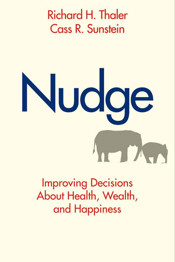Nudge: Improving Decisions About Health, Wealth, and Happiness

This is a book about behavioral economics – why humans make the choices they do, and how they can be persuaded to make other choices. Well, not “persuaded” so much, but rather – wait for it – nudged.
A “nudge” is a change to how a choice is framed or presented that causes people to pick an option other than the one they would of picked normally.
The book apparently gave birth to the concept of Nudge Theory, which is:
[Nudge theory] proposes adaptive designs of the decision environment (choice architecture) as ways to influence the behavior and decision-making of groups or individuals. Nudging contrasts with other ways to achieve compliance, such as education, legislation or enforcement.
The phrase “choice architecture” sums it up – how do we design or architect choices to encourage people to do the right thing? How do we make the right thing easier or more attractive? How do we apply this theory to things like saving for retirement, saving the planet, etc.
Unfortunately, that’s where it breaks down a little, because the book drifts into public policy, which I found a little boring. The authors are both self-described “libertarian paternalists”:
Libertarian paternalism is the idea that it is both possible and legitimate for private and public institutions to affect behavior while also respecting freedom of choice, as well as the implementation of that idea.
I think the idea is that we give people the freedom to make dumb choices, but we manipulate them into doing the right thing? I’m not totally sure, but the book got a little preachy in the second half.
There’s also a website: nudges.org, but I’m not linking to it, because as of this writing, it appears to be dead. The larger point, however, is that the authors we trying to start a movement of sorts (and given that Nudge Theory has a Wikipedia page now, perhaps they succeeded?).
It’s not a bad book, but in the end, it felt like a run-of-the-mill business title on behavioral economics, of which there are many (examples: Thinking: Fast and Slow and The Elephant in the Brain)
Book Info
- I have read this book. According to my records, I completed it on .
- A hardcover copy of this book is currently in my home library.